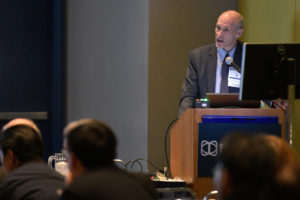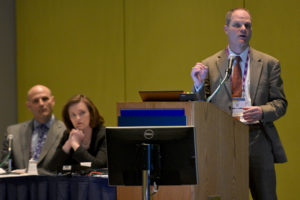
Engineered T cells and immune checkpoint inhibitors show promise for treating GI cancers
Two new strategies are emerging to treat GI and other cancers — engineered T cells and immune checkpoint blockade treatments.

Two new strategies are emerging to treat GI and other cancers — engineered T cells and immune checkpoint blockade treatments.
CRC screening guidelines vary around the world. The U.S. is one of the only countries, for example, that relies heavily on colonoscopies for CRC screening in average-risk populations. Other countries tend to rely on less expensive and less invasive screening technologies for average-risk screening.

Clostridium difficile colitis does not happen in a vacuum. When, why and how C. diff populations explode and cause colitis is the result of a complex interplay among bacteria, human host, the gut microbiome and the environment.

Medicare payment systems are undergoing perhaps the greatest change since Medicare was enacted in 1965 due to a law known as MACRA, the Medicare Access and CHIP Reauthorization Act of 2015.

“In his presidential address on Monday at DDW®, AGA President Timothy Wang, MD, AGAF, reviewed AGA’s accomplishments and priorities under his leadership over the past year, highlighting several new tools that help AGA members address changes to the GI practice environment.
The AGA Research Foundation Benefactors’ Dinner on Saturday night honored members of the AGA Legacy Society, who invest in research through their generous donations to the foundation.
About 15,000 GI professionals attend DDW® each year and about half of those attendees come from outside the U.S.
With that in mind, AGA has organized several sessions for international attendees, including summary presentations from the recent United European Gastroenterology (UEG) Week, as well as sessions in Spanish and Mandarin.
Technology has changed the way we learn, and millennials are a prime example of that. Using information, not just learning it, has become a key to success, according to Ryan Madanick, MD, moderator of Tuesday’s AGA Academy of Educators Plenary Session Integrating Education Technology in the Era of Millennial Learners.
Gastroenterologists treating patients with celiac disease face a difficult choice when deciding whether to biopsy. New European guidelines for pediatric patients suggest that serum markers and genetics are sufficient to confirm a diagnosis in many patients. U.S. guidelines still generally call for a biopsy to confirm the diagnosis.
Siddharth Singh, MD
Assistant Professor of Medicine, Division of Gastroenterology, University of California, San Diego
This website uses cookies so that we can provide you with the best user experience possible. Cookie information is stored in your browser and performs functions such as recognising you when you return to our website and helping our team to understand which sections of the website you find most interesting and useful.
Strictly Necessary Cookie should be enabled at all times so that we can save your preferences for cookie settings.
If you disable this cookie, we will not be able to save your preferences. This means that every time you visit this website you will need to enable or disable cookies again.